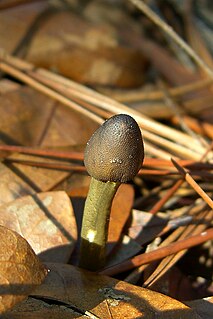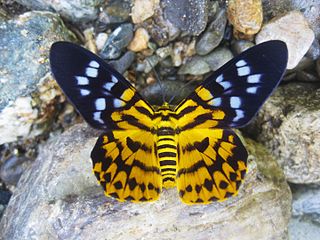
The Hypocreales are an order of fungi within the class Sordariomycetes. In 2008, it was estimated that it contained some 237 genera, and 2647 species in seven families. Since then, a considerable number of further taxa have been identified, including an additional family, the Stachybotryaceae.
Myrothecium verrucaria is a species of fungus in the order Hypocreales. A plant pathogen, it is common throughout the world, often found on materials such as paper, textiles, canvas and cotton. It is a highly potent cellulose decomposer.

Ceratomantis is an Asian genus of praying mantids in the family Hymenopodidae: subfamily Oxypilinae.
Peethambara is a genus of fungi in the Hypocreales order; previously classed incertae sedis, this genus is now placed in the family Stachybotryaceae.

The Trigonopterygoidea are an insect superfamily in the Orthoptera: Caelifera. Sometimes described as leaf grasshoppers, American species in the Xyronotidae have also been called razor-backed bush-hoppers.

The Trigonopterygidae are an insect family in the Orthoptera: Caelifera found in south and south-east Asia.

Monistria is a genus of grasshoppers in the family Pyrgomorphidae and the tribe Monistriini. Species are found Australia, New Zealand and surrounding islands.

Mecopoda elongata is a species of bush cricket of the subfamily Mecopodinae. Species can be found in India, Sri Lanka, Indo-China, China, Korea, Malesia through to Melanesia.
Ganoderma colossus is a Basidiomycete bracket-fungus species in the family Ganodermataceae, previously placed in the genus Tomophagus. Records are from central and southern America and equatorial Africa ; no subspecies are listed in the Catalogue of Life.

Hypocrella is a genus of fungi in the family Clavicipitaceae.
Metarhizium rileyi is a species of entomopathogenic fungus in the family Clavicipitaceae; there is extensive literature under its synonym Nomuraea rileyi.

Purpureocillium atypicola is a species of fungus, previously known as Nomuraea atypicola, in the family Ophiocordycipitaceae with no subspecies listed in the Catalogue of Life. There are records of occurrence from Japan, Australia and New Zealand.
Costantinella is a genus of anamorphic fungi in the family Morchellaceae and class Pezizomycetes

Nemobius is a genus of crickets in the family Trigonidiidae.

The Ripipterygidae are a family in the Orthoptera: Caelifera, sometimes called "mud crickets", in central and South America.
Nemotha is an Asian genus of praying mantids in the family Hymenopodidae: tribe Anaxarchini. The genus was previously placed in the Iridopterygidae, and two species have been placed in the revived genus Tricondylomimus.

Theopropus is an Asian genus of praying mantids in the family Hymenopodidae: subfamily Hymenopodinae.
Trichoderma hamatum is a species of fugus in the family Hypocreaceae. It has been used a biological control of certain plant diseases.
Aschersonia is a genus of fungi in the order Hypocreales and family Clavicipitaceae.

Dysphania subrepleta is a species of false tiger moth in the subfamily Geometrinae. Records are from Indo-China and western Malesia including Borneo, with no subspecies listed in the Catalogue of Life, where it is a "provisionally accepted name".












